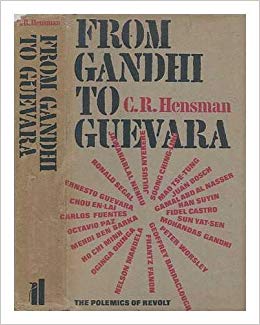Review of From Gandhi to Guevara: the polemics of revolt by C.R.Hensman,
’An African elephant cannot stumble’, complained Malcolm X, ’without falling on a white man with a shovel.’ The white man has since gone from Africa, but he still hangs on to the shovel-by remote control. No African can look for his history or predicate his own future without some white expert telling him-from the vantage point of his civilisation -how grossly mistaken the ’native’ was. Witness, for instance, the initial refusal of the white Africanists (at the Montreal Conference last October) to heed the demand of the minority black caucus for an equal say in determining African studies- on the grounds that such inequitable representation on the executive council would be contrary to democratic principles! That the blacks were only seeking to direct the study of their own societies did not merit consideration.
It is a similar imperialism of the mind which inhibits western critics from making a sensitive assessment of the literature of the Third World. Whether this stems from a genuine ignorance compounded by a sense of racial superiority or from the fear of losing one’s intellectual investment in African or Asian or Latin American studies is unimportant. What is to the point, however, is that these pundits should exercise the power of life and death over the works of Third World writers without themselves having done their homework or unload- ing their minds of imperial lumber. From Gandhi to Guevara is a corrective to such insensibility. Here, in this book of readings, are gathered the thoughts, the ideas, the dreams of men who are attempting to re-create their societies from the rubble of a colonial past. That they are the writings of ’disparate personalities’, as Mervyn Jones remarks in the New Statesman, is a trite observation. Of course, there is no such thing as a Third World persona. But there certainly is a Third World ethos. However different from each other, in terms of social and political systems, the countries of the Third World may be, and however varied their cultures and life-styles, there is a common vision of society and of man-in-society which binds them ineluctably. Their problems too centre around the same difficulty : how to realise the tragically suppressed potential of human and natural resources. And both, vision and obstacle, derive their common denominators from the common experience of colonial oppression. To find one’s roots again in the face of the imperial negative and to assert, even in so doing, that ’the individual should take on the universality inherent in the human condition’ is itself a creative act. To allege, as Professor Tinker has done, that ’reaction to Western dominance’ is not a creative thing is not merely to slur over the devastating effects of colonial- ism but to misunderstand the process of creation itself. ’Death, thou shalt die’ is an initiation to life.
That Mr. Hensman should have, in his anxiety to be representative, included in the space of one volume excerpts from the writings of as many as forty authors is perhaps a matter for regret. But, on the other hand, I for one would have been hard put to find one piece in this collection that I would have, with equanimity, left out. One needs rather to view it as an introduction to the subject, a guide, a source book, an outline map of the literature, made that much more coherent by Hensman’s informed introduction and link passages.

